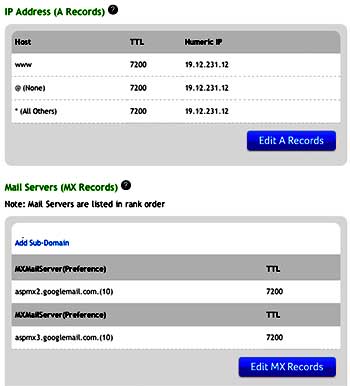By: Michael Diedrick on May 15, 2012
 Not too long ago, any hosting company hosted the Domain Name Service (DNS) of a web site, but that’s very much outdated, and not the smartest move. So let’s talk about what DNS is and what the better way to manage it would be.
Not too long ago, any hosting company hosted the Domain Name Service (DNS) of a web site, but that’s very much outdated, and not the smartest move. So let’s talk about what DNS is and what the better way to manage it would be.
1. What’s a domain name? (the basics)
When you host a website, there’s a funny numbering address that would go with that site called an IP address. It looks something like 12.34.56.78 (for IPv4, the current/old standard). You don’t want to tell people to go to your website at 12.34.56.78 because that’s impossible to remember, and ti changes from time to time. Thus the domain name was born, like yoursite.com. So when you ask the interwebs what’s the address for yoursite.com, it goes to a Domain Name Server that says “Hi, you’re looking for yoursite.com and it’s at 12.34.56.78.” Think of DNS as a phone book.
2. What’s a registrar? (the vendors)
It’s the folks you purchased the domain name from -- Network Solutions, register.com or Godaddy, say. (There are hundreds of registrars.) They’re the people who publish where the Domain Name Server is for your site. They publish a phone book. The registrar, by the way, is the only single point of failure that can take down all your services, so they have to be reliable..
Pro tip: keep your domain name with a reputable registrar -- the ones who will let you manage the DNS without extra charges, the ones who send you clear notices when your domain is about to expire, and the ones who will be very nice about if you want to leave them. Some unknown/old school registrars like to keep the keys from you, and that never makes anyone feel safe, except, of course, them.
3. Who should actually host the DNS, versus the site? (old versus new)
The old way was to have your hosting company manage every service of a domain name. With the advent of better, more secure and cheaper email hosting, or specialized tools like an intranet inside of an organization, you’re basically committing that everything run through one company, always. The reality is that few hosting companies were any good at email and few specialized in the myriad of other services associated with a domain name. Nobody can be good at everything -- there’s just too much specialization. And then there’s the part where you put all your eggs in one basket -- what happens if the hosting company goes belly up, or gets bought out, or hacked? Well, you’d lose everything.
The new way solves those and other problems simply by hosting your DNS with your registrar. That way you can allow each service provider to manage their own records related to the domain name -- your hosting company can manage the A Names, your intranet can manage a CName or two, and your email provider can manage the MX records, all fancy ways to say that everyone plays well together. And if a provider flakes, your domain name is always safe with the people you purchased it with, and worst case scenario only one service will go down. And hey, why not let the phone book publisher tell the world your number -- they’re the ones who know anyway.
Pro tip: let your registrar be your registrar. Never ever host a website or email with them. Every one we’ve worked with has the worst service, most restrictive permissions and slow servers, and that doesn’t seem to be changing anytime soon.